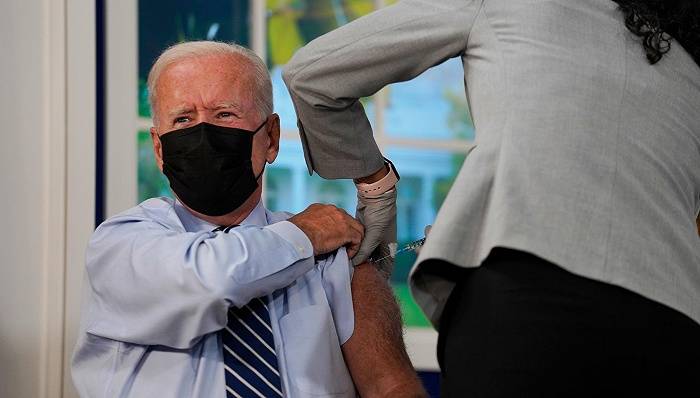Original title: 78 year old Biden received booster injection. Why didn't the pharmaceutical company have a new vaccine for Delta?

On September 27th, White House officials said Washington President Biden was vaccinated against the new crown virus vaccine. Source: Vision China
Reporter Tian Siqi
On the afternoon of September 27 (Monday), 78 year old US President Biden received a booster injection of the new crown vaccine at the White House. Just a few days ago, the United States just approved booster vaccination for people over the age of 65 and other high-risk people.
"We know that to fight this epidemic and save lives... We need to vaccinate people," Biden said in his pre vaccination speech. "So please do the right thing and take these doses. It can save your life and the lives of people around you."
Biden also joked that his age was "far over" 65, which was why he was eligible for booster shots. Before taking office as president in January this year, Biden had received two injections of Pfizer vaccine, and both injections had no side effects. First lady Jill Biden also received booster shots late Monday.
With the introduction of booster injections, the United States will significantly increase the number of new crown vaccines delivered to foreign countries from 2022. Biden announced last week that the United States would purchase an additional 500 million doses of Pfizer's new crown vaccine and donate it to low - and middle-income countries. Who director general Tan Desai reiterated his appeal on the 27th that countries should suspend vaccination booster injections at least before the end of this year to distribute them to vulnerable countries.
Since May of this year, a highly infectious COVID-19 delta variant has caused many countries to suffer from a new outbreak. A large number of people who have been vaccinated all over the world have pushed up the demand for vaccination.
Others said that the new version of vaccine specially developed for delta variant should be vaccinated at present. In fact, Pfizer, Modena and other vaccine manufacturers are developing vaccines for delta variants, but vox analysis of American media believes that the demand for specially customized vaccines for delta is not as high as expected.
Pfizer and biontech are testing a new version of the vaccine against the delta variant, and the results of clinical trials are expected to be released in the fourth quarter of this year. Vaccines against beta variants are also being studied.
Modena also announced that a new vaccine formulation for beta and delta variants is being tested. Three of the company's four candidate vaccines have entered phase II trials.
At the same time, the two vaccine manufacturers also pointed out that the original version of the vaccine had a significant effect after vaccination. Pfizer said that the third dose of vaccine for people aged 18 to 55 could increase the antibody against delta variant by five times and 11 times in people aged 65 to 85. Modena also said that after inoculation with the third booster needle, the antibody against delta variant increased 42 times.
Ian foster of Argonne National Laboratory and his colleagues published a new study on medrxiv, a medical preprint website, which shows that the negative impact of delta variant on vaccine effectiveness in the United States is negligible. From mid May to mid August this year, that is, the delta variant has gradually become the main transmission strain, and the effectiveness of all vaccines is still as high as 84.1%.
Immunologist Dan Barucci (Dan Barouch) of Beth Israel Deaconess Medical Center, Bess, USA, further explained that the vaccine effect against the delta variety may not be much better than the original vaccine, because the peak protein of delta is very similar to the original COVID-19 in appearance and shape.
In addition, although the mRNA vaccine technology adopted by the above two companies can ensure that the speed of developing the improved vaccine is faster than that of the traditional vaccine and the clinical trial process is shorter, it will take at least a few months from experiment, production to regulatory approval.
Benjamin Linas, an epidemiologist at Boston University, said that another reason for not producing delta vaccine is that it may send the wrong signal to the public that "the original vaccine has not worked". At present, a large number of original vaccines that have been produced are not used. If people only accept the "improved" new version of vaccines, the original vaccine inventory will be wasted.
Angela Rasmussen, a virologist at the University of Saskatchewan, told vox: "we don't need a specific vaccine for Delta... What we need now is the opportunity for a third vaccination, not waiting. This is especially true for high-risk groups."
主营业务:website,cms,wap website

 扫一扫,关注我们最新消息
扫一扫,关注我们最新消息 